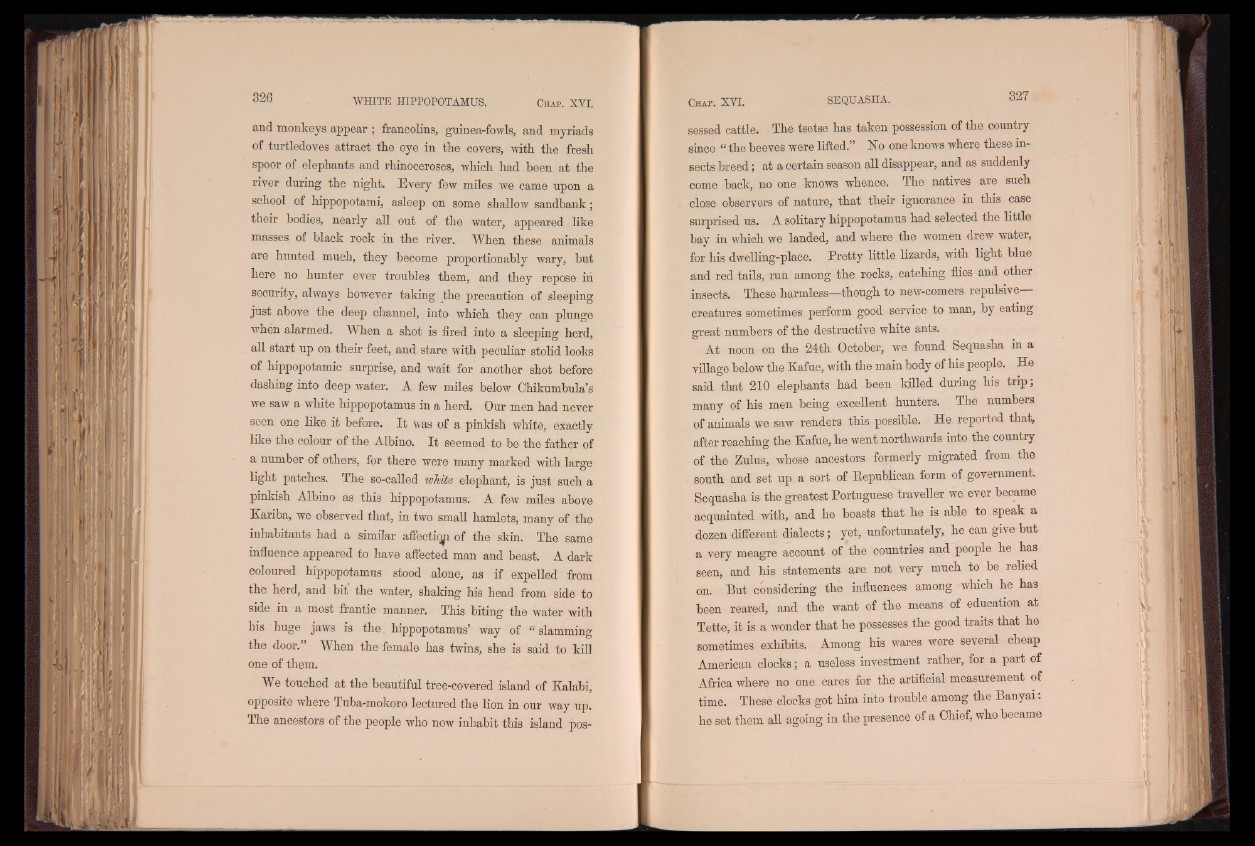
and monkeys appear ; francolins, guinea-fowls, and myriads
of turtledoves attract the eye in the covers, with the fresh
spoor of elephants and rhinoceroses, which had been at the
river during the night. Every few miles we came upon a
school of hippopotami, asleep on some shallow sandbank;
their bodies, nearly all out of the water, appeared like
masses of black rock in the river. When these animals
are hunted much, they become proportion ably wary, hut
here no hunter ever troubles them, and they repose in
security, always however taking the precaution of sleeping
just above the deep channel, into which they can plunge
when alarmed. When a shot is fired into a sleeping herd,
all start up on their feet, and stare with peculiar stolid looks
of hippopotamic surprise, and wait for another shot before
dashing into deep water. A few miles below Chikumbula’s
we saw a white hippopotamus in a herd. Our men had never
seen one like it before. I t was of a pinkish white, exactly
like the colour of the Albino. I t seemed to be the father of
a number of others, for there were many marked with large
light patches. The so-called white elephant, is just such a
pinkish Albino as this hippopotamus; A few miles above
Kariba, we observed that, in two small hamlets, many of the
inhabitants had a similar affectiqp of the skin. The same
influence appeared to have affected man and beast. A dark
coloured hippopotamus stood alone, as if expelled from
the herd, and bit the water, shaking his head from side to
side in a most frantic manner. This biting the water with
his huge jaws is the. hippopotamus’ way of “ slamming
the door.” When the female has twins, she is said to kill
one of them.
We touched at the beautiful tree-covered island of Kalabi,
opposite where Tuba-mokoro lectured the lion in our way up.
The ancestors of the people who now inhabit this island possessed
cattle. The tsetse has taken possession of the country
since “ the beeves were lifted.” No one knows where these insects
breed ] at a certain season all disappear, and as suddenly
come back, no one knows whence. The natives are such
close observers of nature, that their ignorance in this case
surprised us. A solitary hippopotamus had selected the little
bay in which we landed, and where the women drew water,
for his dwelling-place. Pretty little lizards, with light blue
and red tails, run among the rocks, catching flies and other
insects. These harmless—though to new-comers repulsive
creatures sometimes perform good service to man, by eating
great numbers of the destructive white ants.
At noon on the 24th October, we found Sequasha in a
village below the Kafue, with the main body of his people. He
said that 210 elephants had been killed during his trip;
many of his men being excellent hunters. The numbers
of animals we saw renders this possible. He reported that,
after reaching the Kafue, he went northwards into the country
of the Zulus, whose ancestors formerly migrated from the
■ south and set up a sort of Republican form of government
Sequasha is the greatest Portuguese 'traveller we ever became
acquainted with, and he boasts that he is able to speak a
dozen different dialects; yet, unfortunately, he can give but
a very meagre account of the countries and people he has
seen, and his statements are not very much to be relied
on. But considering the influences among which he has
been reared, and the want of the means of education at
Tette, it is a wonder that he possesses the good traits that he
sometimes exhibits. Among his wares were several cheap
American clocks; a useless investment rather, for a part of
Africa where no one cares for the artificial measurement of
time. These clocks got him into trouble among the Banyai;
he set them all agoing in the presence of a Chief, who became